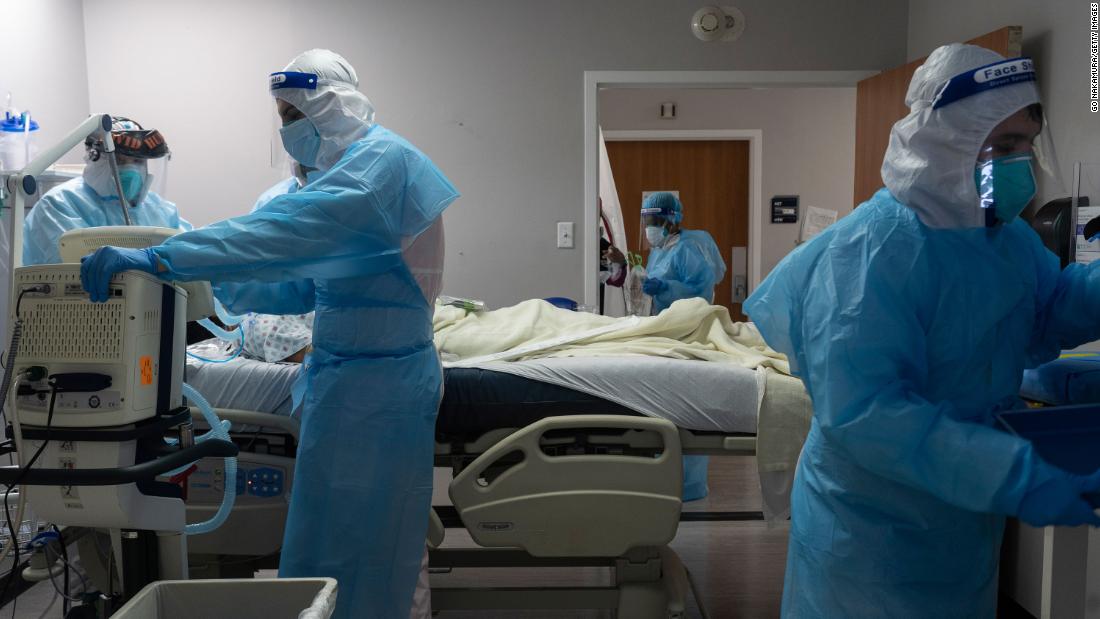
On Wednesday, there were at least 1,893 American deaths from the virus, according to Johns Hopkins University -- the highest daily death toll the country has seen since early May.
Already, more than 241,700 people have died. And with the virus running unabated within US communities, that number will likely only keep climbing.
Another more than 110,000 Americans are projected to lose their lives in just the next two months, according to the University of Washington's Institute for Health Metrics and Evaluation.
The latest high adds to a series of devastating records that have come in just the first days of November. The country has topped 100,000 daily infections at least nine days in a row. Wednesday was the second consecutive day of record numbers of Covid-19 hospitalizations. And Texas has now become the first state to surpass one million infections, just days after the US topped 10 million cases.
And as grim as things may seem, new reports highlight the pandemic is only ramping up as the country approaches a critical holiday season.
Reports warn of 'most diffuse spread experienced to date'
The White House coronavirus task force warned of "accelerating community spread across the top half of the country," in reports distributed to states this week. The task force, which last week warned of "significant deterioration in the Sunbelt," said that has led to the "most diffuse spread experienced to date."
And a separate forecast from the Children's Hospital of Philadelphia Policy Lab projects conditions will worsen in the West Coast, the Northeast and the mid-Atlantic states over the next several weeks.
Hospitalizations, ICU admissions and ventilator usage are rising in every single state, the lab said.
"In every Midwestern state, COVID-19 patients are occupying more than 25% of ICU beds," it reported.
That's as the US reported the highest number of hospitalizations ever on Wednesday -- with more than 65,000 Covid-19 patients nationwide, according to the COVID Tracking Project.
"The nearly universal rise in statewide hospitalization rates, particularly in our colder regions, is a pattern that will grow as we move into the holiday season," the policy lab said.
The findings echo warnings by multiple leading health officials who have urged Americans to lean into safety measures like face masks and social distancing to help curb the spread of the virus and avoid a devastating winter season.
A critical holiday ahead
But experts worry their warnings may fall on deaf ears as some Americans prepare for the Thanksgiving holiday -- where large family and friends' gatherings could help drive infection numbers even higher.
"On a personal level, the most prudent thing that families can do this holiday season is choose not to gather in person with their older higher-risk relatives. However, this pandemic has taken such an emotional toll, on children and seniors alike, that we suspect many families will likely take the risk of gathering," the policy lab noted.
"For those that do, outdoor events are safer than indoors, and conscientious spacing of older vulnerable individuals from the rest of the family will be important," it said. "But even more important is a commitment to quarantine before visiting family."
The holidays also mean many college students will likely return home to spend Thanksgiving with family and could unknowingly bring the virus back with them. College campuses in all 50 states have reported Covid-19 cases since the pandemic's start and institutions across the US continue to implement new measures amid a resurgence of infections.
Syracuse University announced it was transitioning fully to online learning following an "an increase in COVID-19 cases among our student population." And the University of Maryland football program announced it will pause all team-related activities following "an elevated number of COVID-19 cases within the Terrapin's program."
Safety measures aren't going away any time soon
Even with good news about Covid-19 vaccines, a top world health official said Wednesday it's important to keep expectations realistic. For example, preventive measures -- like masks and social distancing -- need to be kept up for a long time.
"While we hope we'll get more good news about vaccines, it's going to take time to scale up production to get them out to all the countries and then get enough people vaccinated so life goes back to pre-Covid days," World Health Organization Chief Scientist Dr. Soumya Swaminathan said during a social media live Q&A.
And even when a vaccine arrives, people may need booster shots in the future, Dr. Anthony Fauci said Wednesday.
"I don't think it's going to be one and done, as they say," Fauci told Financial Times correspondent Hannah Kuchler.
But a vaccine will likely suppress the spread of the virus below pandemic and epidemic levels.
"Then you've got to be careful because as new vulnerable people enter the cohort, globally, they're going to be susceptible," Fauci said. "And as people who were immune lose their immunity, they may become re- susceptible."
Although the efficacy of Covid-19 vaccines being developed is promising, it's too soon to tell how long immunity against the virus will last.
"Traditionally, if you look back at common cold coronaviruses and the experience we have, it is not the kind of virus that usually gives lifelong immunity," Fauci added.
"may" - Google News
November 12, 2020 at 03:04PM
https://ift.tt/2K4ogSx
The US reported the most single-day Covid-19 deaths since May and experts say pandemic is accelerating - CNN
"may" - Google News
https://ift.tt/3foH8qu
https://ift.tt/2zNW3tO
Bagikan Berita Ini














0 Response to "The US reported the most single-day Covid-19 deaths since May and experts say pandemic is accelerating - CNN"
Post a Comment